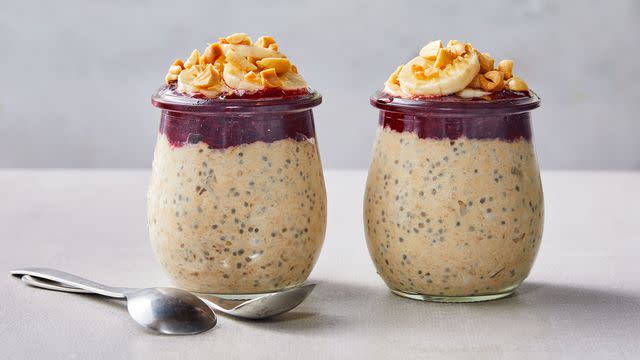7 healthy reasons to drink almond milk
While it doesn’t have quite as much protein as cow’s milk, almond milk is rich in other important nutrients your body craves.

Nichifor Grigore/Getty Images
While French Toast Crunch cereal and low-rise jeans were gaining popularity in the early 2000s, almond milk was right there along with them. Unlike some other turn-of-the century fads, however, almond milk’s popularity has only increased over the years, steadily growing as one of the most reached-for non-dairy milk substitutes on the shelf. The neutral flavor of almond milk has made it the perfect substitute for cow’s milk in both savory and sweet applications, keeping it a long-time consumer favorite.
But in terms of health benefits and nutritional value , how does almond milk measure up to cow milk? We’re breaking down all the health benefits you can count on almond milk for, as well as some delicious ways to integrate it into your everyday routine.
Related:These Are the Healthiest Milk Alternatives, According to a Dietitian
Health Benefits of Almond Milk
It’s loaded with vitamin E.
“Almond milk offers up vitamin E, which has powerful antioxidant effects,” says Bianca Tamburello, RDN, at Fresh Communications. As an antioxidant, vitamin E helps the body to fight off free radicals, or harmful molecules that can spark illness throughout the body. It can also help boost both your eye and skin health.
In fact, when it comes to vitamin E content, almond milk really blows cow’s milk out of the water. While cow’s milk contains little to no vitamin E in its natural form, almond milk can offer 50 percent or more of your daily vitamin E needs, depending on the brand and serving size.
It can be a great source of vitamin D
While not every brand of almond milk will be fortified with vitamin D, most are these days—as are many dairy brands—and you can ensure your almond milk is by looking at the packaging and nutrition label. This fortification is welcome as there are very few natural food sources of vitamin D, and for those of us living in the northern part of the country, it can be nearly impossible to meet our daily needs through sun exposure. Vitamin D plays a critical role in the absorption of calcium, helping us to grow and maintain strong bones, among other key functions.
It’s often fortified with calcium for healthy bones.
Speaking of bones, most almond milk varieties are typically fortified with calcium as well, these days. This is great news for those that don’t tolerate or choose to consume dairy, as they won’t miss out on the important benefits of calcium naturally found in cow’s milk (and other dairy foods). When purchasing almond milk at the store, peruse the packaging, ingredients label, and nutrition facts panel to make sure the brand you’re after is fortified with calcium.
Related:9 Cheeses You Can Eat Even If You're Lactose-Intolerant
It’s rich in antioxidant plant compounds.
Because almond milk is, of course, made from almonds (a superfood in their own right), every glass will give you a healthy dose of plant compounds. Almonds are full of antioxidant-rich plant compounds, including quercetin and kaempferol, which help to boost our immune systems by squashing inflammation throughout the body.
It provides other important vitamins and minerals.
Again, depending on the brand, almond milk may also be fortified to provide lots of other healthy micronutrients including iron, copper, magnesium, vitamin B12, potassium, and phosphorus! These vitamins and minerals will help your body with healthy growth and development, blood cell formation, energy metabolism, and fluid balance.
It’s vegan and lactose-free.
“Almond milk is a nutritious dairy alternative that can easily fit into most diets, including lactose- and dairy-free, vegan, and plant-based [diets],” Tamburello says. Whether you follow one of these diets or avoid dairy for any other reason, almond milk allows you to still enjoy favorites you love: a bowl of cereal, baked goods, and tons more culinary ventures in the kitchen that would normally require dairy milk. Choosing a non-dairy milk will also help you avoid any antibiotics that some cow’s milk brands may contain, especially if produced in a conventional farming system.
Related:7 Allergy-Safe Food Swaps for Those With Food Allergies
It is naturally low in carbohydrates and calories.
If you need to watch your carbohydrate or calorie intake for any reason, whether it be for managing diabetes or another health condition, almond milk can be a great choice over dairy milk. One cup of almond milk has around 40 calories and between 2 and 4 grams of carbohydrates compared to the 100 to 150 calories and nearly 13 grams of carbohydrate of cow’s milk. Though these differences may seem small, to those keeping an eye on these specific nutrients for their health, especially carbohydrates, it can make a difference, namely because almond milk won’t spike blood sugars in the same way cow’s milk can (as long as you opt for low- or no-added-sugar almond milk options).
Including Almond Milk Into Your Daily Routine
Almond milk can easily fit into your daily routine as it’s such a comparable flavor replacement for dairy. If you plan to use almond milk in savory dishes like creamy sauces, pasta dishes, or soups, make sure to buy an unsweetened, unflavored variety. On the subject of sweetener, Tamburello adds, “it’s important to note that both flavored and unflavored almond milks can have added sugar.” Added sugar promotes inflammation in the body, so if you love vanilla almond milk in your morning latte, that’s totally fine, just try to find an unsweetened brand or one with as little added sugar as possible to moderate your daily sugar consumption.
Also, be extra careful that you’re not serving almond milk or dishes made with it to anyone with tree nut allergies.
Make Your Own Almond Milk at Home
Another fun bonus of almond milk is that you can actually make it at home for a fraction of the price of store-bought almond milk. Doing so will also help you avoid any added sugars, flavorings, or other preservatives that you may be trying to steer clear of. There are so many ways to make almond milk at home – whether you invest in a fancy nut milk maker, like Almond Cow, or simply whizz up some almonds and water in the blender and strain it through cheesecloth. Making almond milk at home can also help you to reap more health benefits from the almond itself by using raw, unsalted almonds with the skins on. But one notable downside to making your own almond milk at home, however, is that it won’t be fortified with vitamin D or calcium, so you’ll need to get those micronutrients elsewhere in your diet.
To make your own almond milk: Blend 1 part almond to 4 parts cool water in a blender until smooth, strain through a nut milk bag or cheesecloth, and voila, almond milk in minutes! Store the leftover almond meal in the freezer for the perfect addition to baked goods, oatmeal, and smoothies.
Recipes With Almond Milk
Spiced Vanilla Almond Milk

Creamy Date Shakes

PB&J Overnight Oats

Related:Pistachio Milk Essentials, Plus How to Make It
For more Real Simple news, make sure to sign up for our newsletter!
Read the original article on Real Simple.






